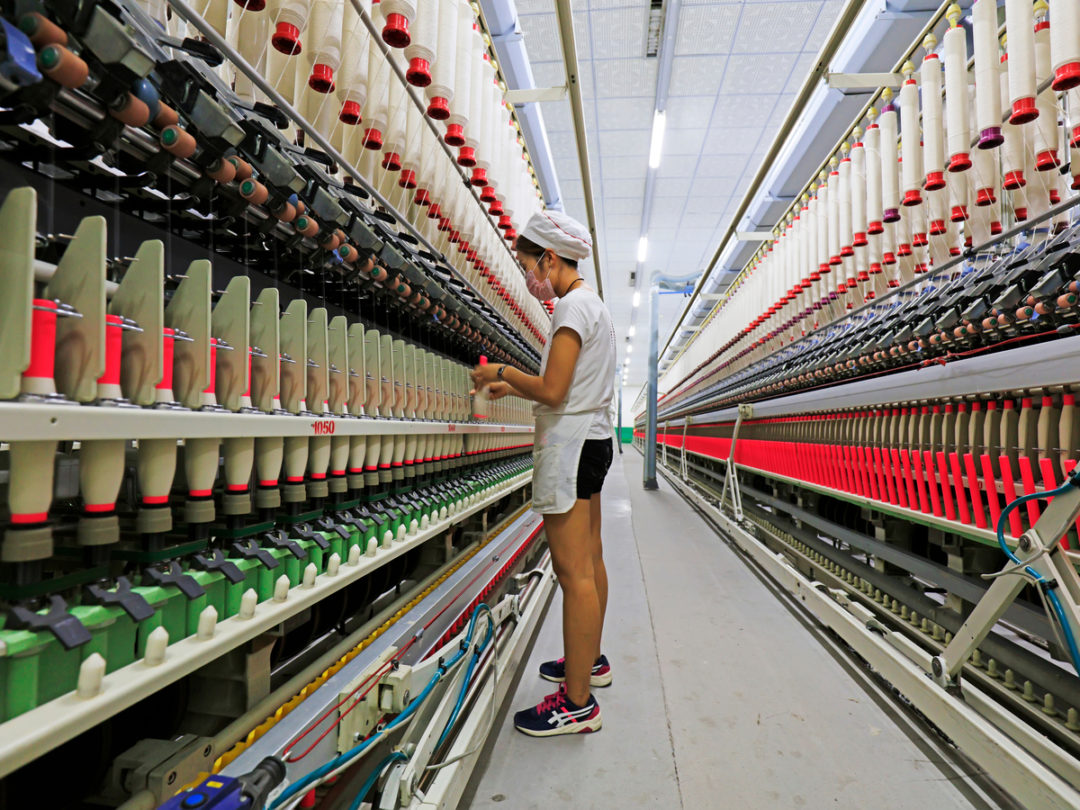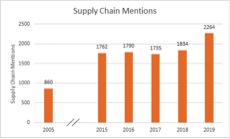
Think Tank
Supply-Chain Awareness Is Growing at America’s Top Companies

Drawing on annual reports of S&P 500 companies, mentions of “supply chain” have grown nearly 30% in the past five years.
Companies have realized how complex their supply chains have become, and the challenges associated with this complexity. In response, here are some key trends that have emerged — and how the coronavirus pandemic could affect them.
Supply-Chain Complexity
More than 50 companies have described their supply chains as “complex” in their annual reports since 2015. They attribute increased costs, lost sales and slower product movement to a rise in supply-chain complexity. For example, beauty products maker Coty Inc. acknowledges that “since our supply chain is complex, we may face operational obstacles and reputational challenges with our customers and stockholders.”

Hanesbrands Inc. has a “complex global supply chain and distribution network that supports our ability to consistently provide our products to our customers,” the company writes. Micron Technology Inc., a manufacturer of memory and storage solutions, has broadened its product portfolio in recent years, an action it says “also increases the complexity of our manufacturing and supply-chain operations.”
Some companies have taken a different course of action. As The Coca-Cola Company acquires businesses, it admits that it might not be able to manage the additional complexities involved, and might instead “seek to manage acquired businesses in a more independent, less integrated manner.”
Some have capitalized on the increase in complexity by developing new products and services. In Verizon’s 2016 annual report, the company announced it had developed internet-of-things solutions “that address key market needs for … drug companies and others with complex supply chains.”
Many of these discussions stem from the conflict mineral reporting requirements in the 2010 Dodd-Frank Wall Street Reform and Consumer Protection Act. Section 1502 required companies to report if any tantalum, tin, tungsten or gold used in their products or manufacturing processes originated in the Democratic Republic of the Congo (DRC). The mining of these four minerals is believed to fund armed militia groups in the area.
As companies investigated the existence of the minerals, they began to understand the complexity in their supply chains. Although Dodd-Frank was passed in 2010, it allowed for a grace period until 2014, at which point companies would be required to report on their conflict mineral content.
One of the most common concerns in annual reports since 2015 has been the protection of brand reputation. According to Harley-Davidson Inc., “The Company's supply chain is complex, and if it is not able to determine the source and chain of custody for all conflict minerals … then the Company may face reputational challenges with customers, investors or others.”
When a mineral is found to have originated from the DRC, changing suppliers is not a trivial matter. Motorola Solutions Inc. notes that there is a “limited pool of suppliers who can provide verifiable DRC conflict-free components and parts.”
The Response: Simplification
Many companies have responded to the increase in supply-chain complexity with a plan for simplification.
Ecolab Inc., a provider of water and hygiene products, has been reducing “plant, distribution center and redundant facility locations” to streamline and simplify its supply chain. Others have focused simplification efforts on the beginning of the supply chain. Oracle Corp. has been reducing “the number of third-party manufacturing partners and the number of locations where these third-party manufacturers build our hardware products.”
A few companies have been aggressively pursuing a simplification strategy, and have launched a company-wide initiative for that purpose. These programs receive more visibility across the organization, and the attention of senior management.
In 2018, Kimberly-Clark initiated its Global Restructuring Program, aimed at “streamlining and simplifying our manufacturing supply chain and overhead organization.” The company expects the program will “make our overhead organization structure and manufacturing supply chain less complex and more efficient.”
Newell Brands launched Project Renewal in 2011, “to reduce the complexity of the organization and increase investment in the most significant growth platforms within the business.” In 2014, it expanded the program by “further streamlining its supply-chain function” and “reducing operational and manufacturing complexity.”
In 2012, Colgate-Palmolive Co. initiated a Global Growth and Efficiency Program. Like Newell Brands, Colgate-Palmolive expanded its program in 2014 to include commercial hubs and “optimize global supply chain and facilities.”
Snack manufacturer Mondelēz International Inc. has the most aptly named simplification program: Simplify to Grow. Its primary objective is to “reduce our operating cost structure in both our supply chain and overhead costs.” The company mentions the program 40 times in its 2019 annual report, referring to it not only as a simplification program, but one that will also increase profitability.
Additional actions toward the goal of simplification include cutting the number of suppliers, eliminating redundant locations, reducing manufacturing complexity, and streamlining the supply chain.
Non-Traditional Sectors
Supply-chain awareness is catching on in sectors where it has been less prevalent, such as financials, utilities and real estate. S&P 500 companies across these sectors had only 42 supply chain mentions in 2015, but that number grew 71% to 72 mentions in 2019.
Financial company Charles Schwab Corp. made no mention of supply chain in its annual reports prior to 2019. But in the company’s 2019 report, “improved supply-chain efficiencies” were cited as one of the factors that contributed to the company’s improvement in gross profit dollars.
Utility company Alliant Energy Corp. has used acquisitions to enhance its “transportation value to customers, by adding customized supply-chain solution capabilities to their portfolio of service offerings.”
Real estate and timberland giant Weyerhaeuser Co. made no mention of supply chain in its 2015 annual report, but mentioned the term six times in its 2019 report. Touting its supply-chain expertise, Weyerhaeuser emphasized that “we use our scale, infrastructure and supply-chain expertise to deliver reliable and consistent supply to our customers.” When the company listed its competitive strategies in its 2019 annual report, the first of five bullet points was “continuing to capitalize on our scale of operations, silviculture, and supply-chain expertise and sustainability practices.”
Early Impact of COVID-19
The time frame of this research concludes with S&P 500 companies’ 2019 annual reports. Since almost 90% ended their fiscal year on or before December 31, 2019, most made no mention of COVID-19.
A few were able to include comments about the pandemic between the end of the company’s fiscal year and release of the annual report. Those that released their annual reports in early 2020 expressed fewer concerns regarding the impact of COVID-19 on their supply chains.
In Dollar General’s annual report released on January 31, 2020, the company declared that “we do not anticipate that supply-chain disruptions either known or experienced to date as a result of the COVID-19 outbreak are likely to have a material impact on our financial results in 2020.” AT&T said it had “not experienced any disruptions from our wireless handset supply chain due to the coronavirus epidemic in China, but we continue to monitor the situation.”
By contrast, Sealed Air Corporation noted the interconnectivity of its global supply chain, and said it believed that “the impact of COVID-19 may extend beyond the Asia Pacific region.”
The tone was much different for companies that completed their 2019 fiscal year in early 2020, and released their annual reports in March and April of 2020.
According to Microchip Technology Inc., “The ongoing COVID-19 pandemic has resulted in a global reduction in economic activity by adversely affecting production.” NetApp Inc., a provider of systems and services for managing data, confirmed that “the COVID-19 pandemic has, and we expect it to continue to, adversely affect our business in a variety of ways.”
Forthcoming 2020 annual reports will certainly have considerable discussions of the COVID-19 impact on companies’ supply chains.
The field of supply chain continues to grow, and is gaining traction in sectors where it was once rarely considered. Businesses are realizing just how complex a supply chain they have built, and have responded with company-wide simplification programs. However, these adjustments in the future may be even more drastic, as supply chains adapt and transform in response to the global pandemic.
Mark Kosfeld is associate director of the Supply Chain Management Institute at the University of Wisconsin-Milwaukee.






